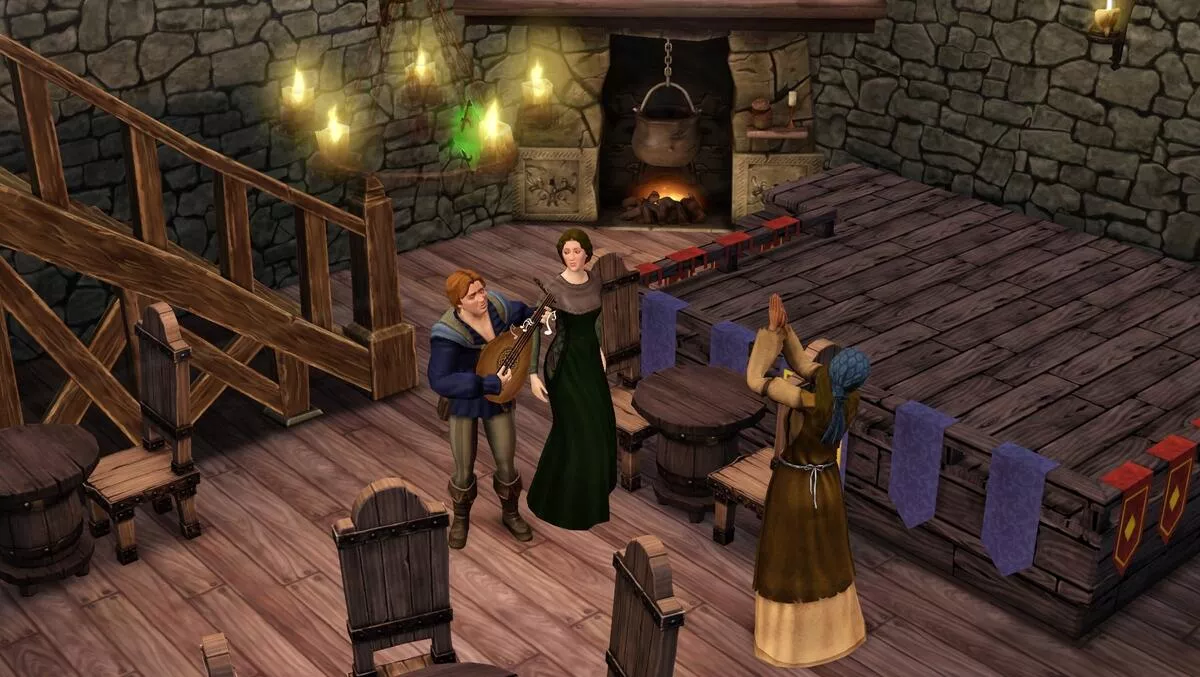
Review: The Sims Medieval
Genre: Life simulation Classification: M - suitable for mature audiences 16 years and over. Platform: PC
Did you know that King Arthur was a womaniser, Sir Lancelot was a washed-up drunk, and Merlin was just a real grump? According to my Sims Medieval kingdom, that is.
Set firmly in the stereotypical fantasy Middle Ages, complete with castles, stocks, knights and minstrels, The Sims Medieval represents a change in direction for the series from its traditional sandbox roots.
For starters, you can no longer just "jump in" and play with any Sim or household in an open and unrestricted manner. This story is all about your Kingdom and its road to glory, or self-improvement, or whatever goal you end up choosing for its long-term objective.
As "The Watcher", a deity-like figure, you can control the growth of your kingdom by choosing which parts of the town should be built next.
New buildings unlock new characters to occupy them. Those who want to control a crazy household of mismatched misfits, however, will be disappointed, as each building has a single occupant that lives, eats and works there. After all, what good is a smithy without a blacksmith, or a church without a priest?
Where The Sims Medieval focuses its new gameplay direction instead is on a novel quest system. To play the game, you have to select from a list of quests currently available for your kingdom. For example, there might be a legend of a magic fountain to investigate, a witch that needs exposing, or a magic frog that needs kissing.
For each quest, there are a number of suitable "heroes" to choose from as the principal character. As you advance and unlock new buildings, more characters and alternative quests (and ways to complete them) present themselves. The character you choose is the Sim that you will control for the duration of this adventure.
While some people might find it annoying to have restrictions on the Sims you can control, it can offer a refreshing change to go from King to Doctor to Blacksmith etc. You may be surprised at the characters you end up enjoying the most. As characters complete quests, they level up, gaining new skills and recipes.
While on the topic of characters and quests, as aforementioned in my opening statement, each character you create has two selectable attributes and a compulsory "fatal flaw". In the case of my Knight, he suffered from the need to drink, and had to regularly visit a keg to avoid falling into depression. Thankfully, he was blessed with a vision of a magic fountain (a special, unique quest) that, eventually, after jumping through several hoops),lead him to be cured of his flaw. He even picked up an even more powerful positive trait at the end of the process.
However, it's not all beasts and banquets, you know. Things have to get done around the kingdom too! That's right, while your Sim no longer goes "to work" for large portions of their day, they have responsibilities that must be fulfilled each day. These are random within a character's role, and change each day.
The blacksmith might have to forge and deliver a new sword, and then mine some ore; the doctor may have to tend to patients or make some potions. Even the monarch is not exempt, with laws that need drafting and beasts that need to be hunted. Failure to complete the Sims' daily responsibilities results in a negative focus penalty (the replacement for the happy/sad meter), which could hinder your ability to carry out a key component of your larger quest. Some of the responsibilities, like hunting, require your Sim to wander into the forest for a bit, resulting in a summary story at the end. Others, like blacksmithing, require you to actively manage your smith's choice of forging and hammering to keep the steel in a specified temperature zone.
On top of juggling your Sims' needs to eat, sleep and carry out their daily tasks, you still need to find time to research that illusive magic fountain or cursed frog for the next step in your long-term quest.
By 'long-term', I mean about 15 minutes, which brings me to another point: The Sims Medieval plays very much like previous Sim titles, which makes it feel rather abrupt to "end" your gameplay after 10 to 20 minutes rather than after a couple of hours.
While this might frustrate gamers who loved immersing themselves for days on end in their Sims' virtual lives (perhaps even to the detriment of their real lives), The Sims Medieval offers much more of a bite-sized, episodic mentality. Another area that might frustrate some gamers is the inability to create or customise buildings. However, you can still customise interiors and furniture. Each Sim earns his own money, which is used to buy items for their own property.
Technically, The Sims Medieval looks nice enough – about on par with other Sims titles – and sounds similar, too (although the Simish language has now been updated to sound a little more like ye-olde Simish). The controls are fairly straightforward, and anyone who has played The Sims 3 should pick it up quite quickly.
While it's well polished, The Sims Medieval is neither a fantastic game nor a bad game, but rather it has both nice touches and a few "fatal flaws" of its own. I could recommend it for people that like The Sims, but those same people may also be among the most frustrated or disappointed at the changes. Personally, I enjoyed the experience overall, and while I won't sink days' worth of gameplay into it, I will return for the odd quest from time to time.
Graphics: 8
Sound: 8
Gameplay: 8
Lasting appeal: 6
Overall Score: 7

